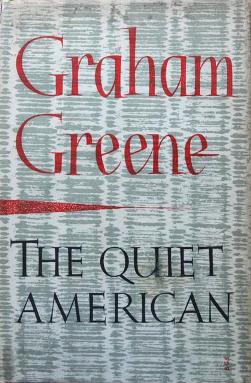

Image via Wikipedia
Graham Greene‘s classic novel The Quiet American, though written in 1955, is still a biting indictment of American foreign policy. His novel takes place in Vietnam (prior to the US/Vietnam war); the narrator, Thomas Fowler, is an English newspaper correspondent who meets Pyle, an American CIA operative, the “Quiet American” of the title. Pyle, one of two Americans in the novel — the other being Granger, a fellow correspondent.
WIth these two characters, Greene sums up the main stereotypes of the American-through-foreign-eyes. Granger is an abrasive, loud-mouthed jackass who makes no attempt to blend in with the surrounding culture; on the other hand, Pyle is a naive idealist who also makes no real attempt to understand the surrounding culture. After all, in his eyes — as well as Granger’s — their own culture is by far the best. Pyle’s idealism makes him want to shape the world in America’s image, while Granger’s more of a “Well, that’s not how it is back home!” complainer type.
Speaking as an American, I’m pretty attached to American culture. Unfortunately, Pyle doesn’t see the harm in doing what he thinks has to be done. When the terrorist bombings he was behind don’t kill their intended targets, but instead women and children, yet are blamed on the Communists he considers it a success. The target enemy parade was cancelled, and the standard everyday business of the public square took place. Aside from warning any Americans he saw (and his and Fowler’s mistress Phuong) to stay away from the area, Pyle did nothing and didn’t even seem to be particularly affected by the deaths of the Vietnamese civilians.
Greene, the writer behind Our Man in Havana and The Third Man
, makes the book more-or-less timeless. There are a few hints that the book was written in the 1950s; there’s no swearing for one, including at least one attempt where an expletive is covered up by an explosion. However – one of the best things about the book, and the thing that keeps it from being a preachy polemic is that while Pyle is somewhat of a stereotype, he’s also a real character, and Fowler, himself, isn’t exactly perfect. Fowler doesn’t particularly care about Vietnam either and has no particular politics — and is a bit of a cynical, egotistical jerk. The fact that Fowler isn’t a perfect being of light exposing the terrible American makes the novel compelling and makes Greene’s points go down a bit easier.
Greene’s an outstanding writer, and this is an outstanding book. If you’re interested in politics, this is definitely worth reading — and the fact that it’s never been out of print makes it pretty easy to dig up a copy, too.
